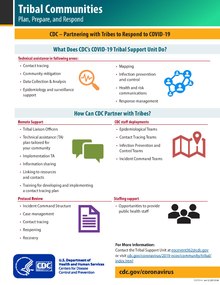Impact of the COVID-19 pandemic on Native American tribes and tribal communities
[1][2] The pandemic exacerbated existing healthcare and other economic and social disparities between Native Americans and other racial and ethnic groups in the United States.
[3] Prior to the pandemic, Native Americans were already at a higher risk for infectious disease and mortality than any other group in the United States.
Other issues facing Native Americans include limited access to water, food insecurity, lack of phone service, and children relying on schools to provide breakfast and lunch.
[4][5][6] According to the Kaiser Family Foundation, data "indicates that a majority of American Indians/Alaska Natives have fewer years of education and are three times more likely to live in poverty and be uninsured than the U.S. general population.
"[7] In addition to the aforementioned difficulties faced by those living on tribal reservations, lack of access to healthcare services and facilities also served as a widespread pre-pandemic condition.
The Leech Lake Band of the Ojibwe Tribal government released a statement noting a significant jump of cases from 3 to 27 over a 2-week period and this has urged members to wear their masks and practice methods of social distancing each and every day.
[14] In Central Minnesota, The Millie Lacs Band of the Ojibwe officials have reported up to 19 cases of confirmed COVID-19 patients.
While tribes have worked hard and endless hours to do everything in their power to slow down the virus, the detrimental effects of the deadly sickness are harming members.
They also have the highest rate of deaths among those who test positive for the virus”[15] In June 2020, Native Americans in New Mexico accounted for 57% of COVID-19 infections, while representing 11% of the state's population.
[24][25] The American Gaming Association created a COVID-19 tracker to provide information to the public on the status of all tribal and commercial casinos in the country.
[26] Any member over the age of 18 that has endured the devastating consequences and outcomes of the viral pandemic will receive a $500 payment and there will be an application process to apply for this grant.
For this specific grant, The White Earth Reservation was awarded more than a total of $29 million in the Coronavirus Aid Relief and Economic Security (CARES) Act.
[26] The City of Mahnomen is working vigorously to provide a state grant program to assist all resident and local business to cope with the expensive bills, due to the lack of hours and reduced income from the effects of this global pandemic.
Navajo Nation has implemented a Stay-at-Home (Shelter in Place) Order and Daily Curfew from 10:00 pm to 5:00 am Effective Until Further Notice.
[14] Tribes have also been doing rapid testing to help enlighten them on the virtual pandemic conditions and the fast spreading of the virus by providing quick and easy aid to positive COVID patients.
[15] Many tribes and tribal communities provided COVID-19 statistics, preventative information, and healthcare and economic resources on their websites, including the following: With the passage of the CARES Act in March 2020, $100 million in funding was secured on behalf of tribes in the Indian Community Development Block Grant.
"[41] In August 2020, the Centers for Disease Control and Prevention (CDC) provided $200 million in COVID-19 funding to Indian Country "to support tribes and tribal organizations in carrying out COVID-19 preparedness and response activities, including surveillance, epidemiology, laboratory capacity, infection control, and mitigation".
[46] The Ojibwe Tribe, which is a member of an American Indian people who surround themselves by regions of the Great Lakes in the United States of America.
[48] South Dakota's pandemic savaged Rosebud Sioux tribe has reported similar levels of success with vaccine distribution as "Out of the close to 5,000 doses they've received so far, only three have been wasted.
"[49] This high prevalence of early vaccination was also reflected in a survey of college students at a Native American-Serving Nontribal Institution (NASNTI) in Colorado.
